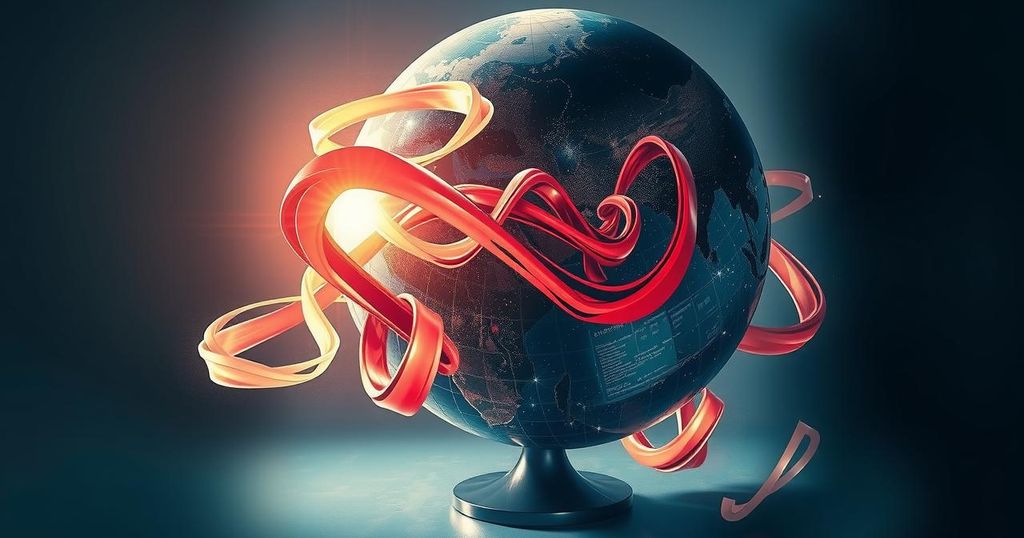As Trump Reshapes Global Dynamics, Xi Jinping and Putin Solidify Ties
Donald Trump’s potential influence on global diplomacy may disrupt the entrenched alliance between Xi Jinping and Vladimir Putin, amid rising tensions in U.S.-China and U.S.-Russia relations. China’s ambitions as a diplomatic player and recent military maneuvers further complicate the geopolitical landscape, particularly regarding Taiwan’s role. The evolving circumstances demand careful attention from all involved nations as they navigate these complex dynamics.
As the geopolitical landscape shifts, Donald Trump’s administration may disrupt the burgeoning alliance between Xi Jinping and Vladimir Putin, who have fostered a significant partnership. Their collaboration intensified following Russia’s invasion of Ukraine in 2022, with both leaders reinforcing their bond through numerous interactions over the years. Recent U.S.-Russia diplomatic efforts have led some analysts to speculate that Washington seeks to weaken Beijing’s influence by creating a rift between Moscow and Beijing.
Trump’s communication with Putin and subsequent discussions involving the U.S. and Russia regarding Ukraine have raised concerns about the potential ramifications for China. Analysts suggest that Xi would welcome any disarray in U.S.-Russia relations, viewing it as a means to bolster China’s stance regarding Taiwan amid a perceived withdrawal of American engagement. Xi and Putin have openly affirmed their strong relationship, vowing to move forward independently of external pressures, particularly from the U.S.
China’s aspirations extend beyond economic dominance to emerging as a diplomatic leader, with aspirations to mediate global conflicts. Beijing considers itself capable of facilitating talks in the Ukraine conflict, having submitted a peace plan and advocating for a diplomatic resolution. However, accusations from Kyiv and the U.S. have emerged, alleging that China aids Russia’s military efforts while remaining judicious in public discussions with Ukrainian leadership.
Additionally, China has displayed military assertiveness recently, demonstrated by naval exercises off Australia’s coast, which some analysts interpret as a test of U.S. and allied responses. It signifies China’s advancing naval capabilities and a strategic assessment of regional dynamics in light of new U.S. policies under Trump’s administration. This military posturing raises concerns about Taiwan, especially given the administration’s hawkish stance on China.
The U.S. has altered its official language regarding Taiwan on its State Department website, escalating tensions with China. While the One China policy remains, the nuanced shift has incited discontent in Beijing, highlighting Taiwan’s significance in U.S. foreign relations. The Biden administration, following Trump’s hardline approach, must approach the Taiwan issue delicately to maintain stability and avoid exacerbating tensions with China.
In conclusion, as Trump reclaims a prominent role in U.S. foreign policy, Taiwan must position itself as a strategic partner to mitigate potential risks. The interplay between the U.S., China, and Russia illustrates the complexity of global relations, with shifting allegiances and stark ideological divides. It remains imperative for Taiwan to demonstrate its value amid the evolving dynamics of international politics.
In summary, Trump’s potential re-emergence in U.S. foreign policy carries implications for global relations, particularly regarding the China-Russia alliance and Taiwan’s strategic significance. The evolving dynamics signal a pivotal moment in international diplomacy, necessitating careful navigation by all parties involved. As geopolitical tensions continue to rise, the effectiveness of diplomatic initiatives and military posturing will shape the future stability of the region.
Original Source: www.abc.net.au




Post Comment